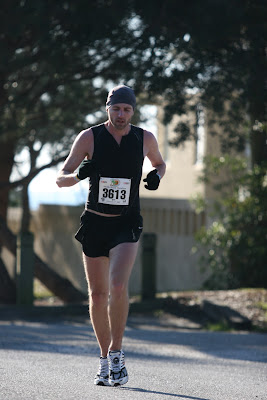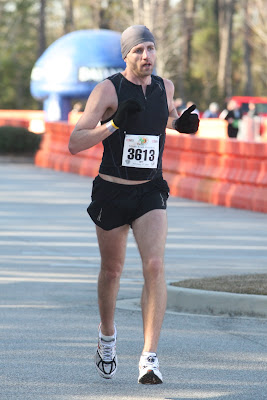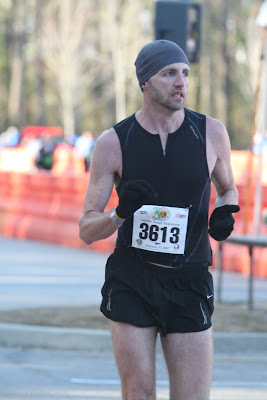
I partially wanted to go to Myrtle Beach on February 17th to run a personal best, but mostly to give me something to focus on and work toward given the tumultuous period that I was going through with stresses of a new job and a move across country. I knew that it was a flat fast course, but my training had not been that intense nor motivated. I pushed upward to a peak of 65 miles a week, but 25% of my total was spent in a simulated running motion on an elliptical and another 25% on my new found passion for technical trail running. As I look back, I was really only running 3 quality days per week, yet working out every day of the week and doing virtually no speed work. So early January I finally committed to running the marathon and booked my flight travel.
When the race day finally arrived, I found myself standing amongst 2500 marathoners and 3500 half marathoners in front of Coastal Carolina Field, waiting in 28-degree weather at 6:30 for the gun to go off. Up until that point, I had planned on running 3:14:54, which at a pace of 7:26 per mile would have been a marathon PR by two minutes and be something that I felt was a safe attainable goal. In the Eastern Time zone the sun doesn’t rise in mid February until well after seven am, so the first few miles would be run in the pre-daylight. I chose to follow my 2006 Green Bay Marathon strategy of starting out slow, picking up the pace mile by mile until eventually I would be running the final 6 miles at sub goal pace. I didn’t want an 8-minute negative split like Green Bay, but I did want to finish strong, passing people at the end, as compared to my 2006 Chicago performance where I tried to even pace and fell off the earth late in the game and finished poorly. In fact, of the top 1000 runners, only 243 ran negative splits. Mine was 1:54.
So that’s the way it started; I let a thousand runners take off in front of me, though I was just three deep at the start line. I stuck to the plan through the first few miles, and kept lowering the pace per mile as planned through mile six. The sun finally broke as we turned south and ran along Ocean Blvd. There were so many hotels along the beach on our left that the sun didn’t peer through that often, but that in combination with running was enough for me to warrant dropping my long sleeve shirt, and going with the customary Sugoi tri top with Nike ‘short’ shorts, gloves and an underarmour beanie for the rest of the race.
Through mile 10 I continued to feel good as we made the turn to head north, and though I was about a minute faster than my goal split for 10 miles, I was still following the plan. I continued to drink water and Gatorade at alternating water stations, located every two miles. As we approached the finish in the reverse direction, the half marathoners split off for their finish, while we pushed ahead north, with 13 more miles to go.
At mile 15 I suddenly began to realize that instead of the 7:25’s I was to be running for the last few miles, I was running 7:10’s and began creating a larger differential between my 3:14 goal time and a vast new PR. I refused to commit to trying to push the pace and try to qualify for Boston at that point, because I know that so much can happen in the last 10-16 miles. Instead I ran mile by mile, telling myself that I would re-evaluate the situation at the end of the next mile.

For the most part now I was running alone; with only a few marathon relay teams running my pace. I began to pass people two or three at a time and moved my way up the rankings. At mile 18 I found myself to be averaging 7:15 pace and just before the turn away from the ocean, I passed the 3:10 pace group. There were 6 guys running with the pacer, and for a moment I considered staying with the group. Their pace seemed to be right on track, but I decided to pass them, knowing that as long as I stayed ahead of them, that I was assured of a qualifying time, because when you are a pacer, you guarantee that you will hit your mark. I think that I read once that in order to be a pacer at a certain time, that you have to have run a recent marathon at least 20 minutes faster than your pace time. So as I pass the 3:10 pacer, I assume that he has run 2:50 in the recent past and that we will take his group to the end at the desired time.
I suffered a fairly severe set back at mile 20.5, as my GPS lost it’s signal. This still baffles me, as I was in the middle of a completely flat section of the course with clear skies and no buildings around me whatsoever. In hindsight, I should have turned it off and then turned it back on in an attempt to find the signal again. At that point, I feared that if I lost my overall time, I wouldn’t be able to calculate in my head where I needed to be at each mile marker to stay n track. Now I realize that I knew where I was for an overall pace, and that is what realty mattered; pace, not time.
I continued to run each mile just like that; 1 mile a time. I passed 50 people in the 2nd half of the race, with 18 of those coming in the last 10km. I was only passed by two people after the halfway mark.
Along the entire run, I had my Motorola Razr with itunes in the lower pocket of my tri-top, playing a mix of tunes that would motivate me. At mile 25.5, I heard the theme song to Chariots of Fire. I laughed out loud because it was like the making of my own movie where I was running barefoot like the find in the tide of the ocean. Though it was inspirational, it was at that point that I realized that I wasn’t going to make my time. I wasn’t up for higher order differential equations after running 26 miles, but I knew that in 5k’s it would typically take my 38 seconds to run the last 0.107 miles, so I assumed that to run the last 385 yards (about 0.2 miles) at my current pace, I would need about a 2 minute buffer to hit 3:10:59. So as I passed the 26 mile mark and turned into the parking lot of Coastal Carolina Field, my heart dropped as the mile marker time was at 3:09:15. I knew that with all of my might and desire that I couldn’t make up 15 seconds in 385 yards.
I pushed as hard as I could but as I approached the finish, I saw the clock change to 11 minutes over 3 hours and I knew that it was over. I would come close; closer than I had ever been; 5 minutes and 30 seconds faster than I had ever run a marathon, but not fast enough to qualify for the Boston Marathon.
I crossed the finish line with a gun time of 3:11:16, later to find out that my chip was 4 seconds faster at 3:11:12, and missed my mark, the mark that I never really decided to admit that I was shooting for until I didn’t make it. Isn’t that an ironic statement?


I muddled around for an hour after the race in my rain poncho (as they didn’t supply Mylar blankets) using anything to cover up with, as the temperature never rose above 39 degrees. I hoped to hear the overall results, wanting to know how I faired before making the pilgrimage back to the car and lifting my tired legs into the rental car and driving back to the hotel. After 30 Oreos and at least another 30 white creme filled cookies to replace some of the 5000 calories I had just burned, the first two pages of results were hung on the side of a semi truck that blocked off an area where a local band played ‘Proud Mary’. Reluctantly, I made my way to the results, fearing what I would find what I already knew. Knowing that I couldn’t go back to an icy bath to help ease the pain and start the recuperation process until I saw my time and pace. I started from the top down, seeing that the winner ran 2:30, and only a handful of others were even close. I finally found my name next to the number 70, indicating that on this near perfect race day that only 69 of the 2500 marathoners competing were able to run faster than me. I didn’t know it at the time, but this placed me in the top 3% and means that I was successful in finishing within the top 5%, a goal I set for myself at the start of every race, no matter what the distance.
I don’t think that I actually shed any tears, but it was a fairly emotional time. I had just run 11 seconds faster per mile than I had ever run this distance at, and I finished 4 minutes faster than what I had set out to run. That said, I wouldn’t be joining many of my friends in Boston this April. I didn’t know anyone else at the race, so there was somewhat of an empty feeling of not being able to celebrate my time, or the success of any other runners that I knew.
I made my way back to the car, then back to the hotel, then the following day back to Huntsville ; home. Now that I have had quite a few days to reflect on the situation, I feel very proud of what I was able to accomplish, and I feel even better that so many of my friends, both running and non running, and family have been very supportive of me.
So as I sit in my window seat on a flight back from a 3-day work trip to Seattle , I realize that I have already set my next goal. In less than 90 days I will run another marathon in Green Bay and hopefully on a flat fast course I will set out to not qualify again, and hopefully I will discover 13 seconds along the course of 26.2 miles. Finding 13 seconds and accomplishing a goal that I didn’t think, that only 4 months ago, when finishing the Chicago marathon, that I would be able to achieve before turning 35.
What is the moral of the story?
In the marathon you have to run smart. You have to run your own race. Go out slow, hydrate properly, build momentum over the distance and begin to feed off of the adrenaline rush that you get by running a negative split. It doesn’t feel very good to hang on after mile 20; it feels phenomenal to continue to drop your pace per mile through the tape. Realize that it isn’t so much about the marathon itself. It is about the months of hard work and training; it’s about the people who help you in your training and support your efforts to compete. Yes, it’s about preparation and execution, but in the end I realize that mostly it’s about respecting the marathon for its utter ability to break you down, to inflict so much pain, yet to result in some much joy when it was over. It’s also about having an appreciation for the gift that I have been given to run fast over a long distance.
Am I the last one to realize this?
So whatever pace or distance you run, don’t take it for granted There are millions of people in the world who can’t run as far as fast as you.
Thank you for reading along.